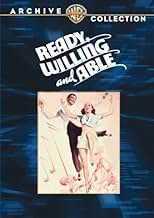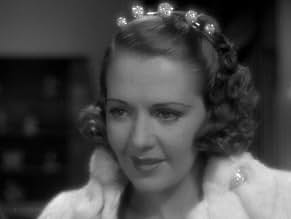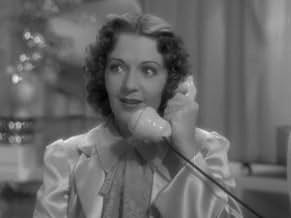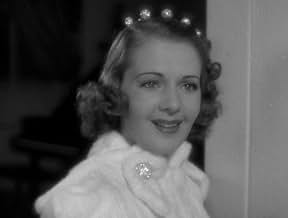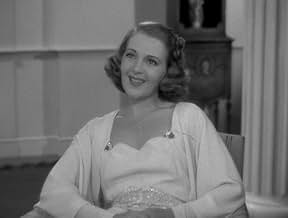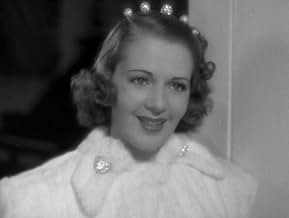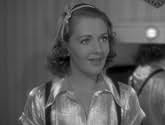Füge eine Handlung in deiner Sprache hinzuTwo songwriters want to cast a British star in their new show.Two songwriters want to cast a British star in their new show.Two songwriters want to cast a British star in their new show.
- Für 1 Oscar nominiert
- 1 Nominierung insgesamt
Al Shaw
- Moving Man
- (as Shaw)
Sam Lee
- Moving Man
- (as Lee)
Lillian Kemble-Cooper
- Mrs. Buffington (Credits)
- (as Lillian Kemble Cooper)
- …
Empfohlene Bewertungen
As people have already noted, 'Ready, Willing and Able' is notable for being Ross Alexander's swansong before his tragic suicide and Ruby Keeler's last film for Warner Bros, but they certainly aren't the only notable factors of the film.
'Ready, Willing and Able' is not a great film, but it does have enough to make it watchable. Keeler is a very charming screen presence, and Alexander a likable leading man. Most of the supporting cast also fare well, with the hoots that are Allen Jenkins and Louisa Fazenda faring best. Wini Shaw is also very winning, as is Jane Wyman.
Of the song score, only one is really outstanding. That is the sublime "Too Marvellous for Words", though "Be Handy on Your Feet" is also catchy and "Just a Quiet Evening" very listenable. Don't remember much of the rest though. The classical music selections of Schumann, Chopin and Liszt are also a delight.
The film looks pretty good, apart from the odd tacky moment, it is very skilfully photographed and while not exactly expansive the set is generally a long way from cheap.
Conversely, to me Lee Dixon was wooden in acting and even more so in his dancing, which doesn't look natural or rhythmic at all. There is a lack of chemistry between Keeler and Dixon, though occasionally a sweet one with Alexander, just that one does miss Dick Powell (who one can't help thinking that he would have been a better choice). The story, even for a film musical, is overly simplistic, goes overboard with the silliness and dumbness and is as thin as thin ice.
Even flimsier is the hugely underwritten and dull script, that's far too lightweight. Of the choreography and dancing, the only one that stands out is the clever type-writing sequence. The others are pedestrian and under-cooked, am aware that one shouldn't expect Busby Bekeley to be involved in every film musical around this time but the songs generally did deserve better treatment than the indifference they were given here, this was a film that cried out for his involvement really.
All in all, watchable but not great. 5/10 Bethany Cox
'Ready, Willing and Able' is not a great film, but it does have enough to make it watchable. Keeler is a very charming screen presence, and Alexander a likable leading man. Most of the supporting cast also fare well, with the hoots that are Allen Jenkins and Louisa Fazenda faring best. Wini Shaw is also very winning, as is Jane Wyman.
Of the song score, only one is really outstanding. That is the sublime "Too Marvellous for Words", though "Be Handy on Your Feet" is also catchy and "Just a Quiet Evening" very listenable. Don't remember much of the rest though. The classical music selections of Schumann, Chopin and Liszt are also a delight.
The film looks pretty good, apart from the odd tacky moment, it is very skilfully photographed and while not exactly expansive the set is generally a long way from cheap.
Conversely, to me Lee Dixon was wooden in acting and even more so in his dancing, which doesn't look natural or rhythmic at all. There is a lack of chemistry between Keeler and Dixon, though occasionally a sweet one with Alexander, just that one does miss Dick Powell (who one can't help thinking that he would have been a better choice). The story, even for a film musical, is overly simplistic, goes overboard with the silliness and dumbness and is as thin as thin ice.
Even flimsier is the hugely underwritten and dull script, that's far too lightweight. Of the choreography and dancing, the only one that stands out is the clever type-writing sequence. The others are pedestrian and under-cooked, am aware that one shouldn't expect Busby Bekeley to be involved in every film musical around this time but the songs generally did deserve better treatment than the indifference they were given here, this was a film that cried out for his involvement really.
All in all, watchable but not great. 5/10 Bethany Cox
Lee Dixon and Ross Alexander are minor actors in the history of Hollywood and here they both star as two struggling guys trying to peddle their musical show. But when you read their back story on IMDb, they are a very sad couple of guys. Before this film even debuted, Alexander (Barry) was dead from a self-inflicted gunshot wound (he was 29)! And, less than a decade later, Dixon (Pinky) would be dead...a guy who drank himself to death at age 42! Talk about tragic! Fortunately, their co-star, Ruby Keeler, had a much happier life!
When the film begins, Pinky and Barry are both struggling to market their new show. Fortunately, they just found a backer--and in order to get this backing they need to sign a British actress. When they go to meet her, the duo make a mistake and accidentally hire an unknown chorus girl (Ruby Keeler) with the same name. She's excited about the opportunity and so she keeps quiet and just accepts the offer. Unfortunately, when folks learn the truth, the show closes. What's next? See the film.
What follows at the end of the movie are a whole bunch of production numbers. Some are a bit dull, though the typewriter sequence is pretty amazing to watch. Overall, a passable bit of entertainment...but not much more. The songs aren't all that memorable and the plot is slight to say the least. The film could have used a bit more comedy to lighten the mood.
When the film begins, Pinky and Barry are both struggling to market their new show. Fortunately, they just found a backer--and in order to get this backing they need to sign a British actress. When they go to meet her, the duo make a mistake and accidentally hire an unknown chorus girl (Ruby Keeler) with the same name. She's excited about the opportunity and so she keeps quiet and just accepts the offer. Unfortunately, when folks learn the truth, the show closes. What's next? See the film.
What follows at the end of the movie are a whole bunch of production numbers. Some are a bit dull, though the typewriter sequence is pretty amazing to watch. Overall, a passable bit of entertainment...but not much more. The songs aren't all that memorable and the plot is slight to say the least. The film could have used a bit more comedy to lighten the mood.
READY, WILLING AND ABLE (Warner Brothers, 1937), directed by Ray Enright, is a lightweight backstage story produced in late 1936 that marked the en of an era for Ruby Keeler as the tap dancing darling of Warner Brothers musicals. With Lee Dixon, Allen Jenkins and Louise Fazenda listed below Keeler's name, the main focus is actually on Ross Alexander, billed fifth in the casting credits. Sadly, upon completion of this musical, Alexander had committed suicide in January 1937, leaving one to wonder how far he could have gone in motion pictures, which began for him in 1932, followed by a Warner Brothers studio contract in 1934.
The plot in brief finds Barry Granville (Ross Alexander), a songwriter, actor and producer, who, along with Pinky Blair (Lee Dixon), hoofer and partner, hope to get their show, "Fair Lady" (no, NOT "My Fair Lady") produced on Broadway. McNeil (Addison Richards), an agent from Amalgamated Pictures, agrees to back the show if they can get a well known personality to appear in it. It is suggested they try to get Jane Clarke, an English musical-comedy star currently making headlines. They so happen to locate a Jane Clarke (Ruby Keeler), an aspiring dancer and student of Broadfield College returning home from England with her classmates. After the ship docks New York, she is approached and mistaken for the English singer by J. Van Courtland (Allen Jenkins), a theatrical agent sponsoring Granville. Jane is coaxed by her friend, Angie (Carol Hughes) to sign an immediate contract with Granville, feeling this would be her big opportunity to crash Broadway. Granville, of course, falls in love with his young "English" star, which makes it difficult for the guilt-ridden Jane to get enough courage to tell him the truth about herself. She does continue, however, with her masquerade, British accent and all. The jig is up, however, when the real Jane Clarke (Winifred Shaw) arrives from England after learning that she's to appear in a show she knows nothing about. However, the English Jane Clarke turns out to also be a fraud, which causes further conflict for Barry.
As with the latter MGM musicals that starred Mickey Rooney and Judy Garland in the late 30s/early 1940s, the cast in READY, WILLING AND ABLE is so energetic, especially Alexander and Jenkins, that it's ashame they couldn't rise above a mediocre script. Alexander's singing voice is obviously dubbed and Lee Dixon (who looks more like a movie cowboy than a Broadway hoofer) tap dances like a puppet on a string. An average score by Johnny Mercer and Richard Whiting includes: "The World is My Apple" (sung by Lee Dixon); "Handy With Your Feet" (sung and danced by Keeler); "Just a Quiet Evening" (sung by Alexander/ danced by Keeler and Dixon at dinner party), "Sentimental and Melacholy" (sung by Winifred Shaw); and the hit tune, "Too Marvelous for Words," which is plugged three times during the story, becoming the closing production number in which Keeler and Dixon tap dance on keys to a giant typewriter, compliments of choreographer Bobby Connolly, whose dance direction is usually mediocre at best. This production number was, however, nominated for an Academy Award for best dance direction. Aside from the song and dance, Louise Fazenda and Teddy Hart do a very familiar comedy routine during dress rehearsal, one that better served comedy team of Bud Abbott and Lou Costello in THE NAUGHTY NINETIES (Universal, 1945). Look for it. Featured in the supporting cast are Hugh O'Connell as Keeler's middle-aged but uninteresting fiancé, Truman Hardy; Shaw and Lee as the piano movers who do tap routines; Barnett Parker as a authentic English waiter; and a very young and cute Jane Wyman as a sharp-tongued secretary.
In spite of mistaken identity plot used numerous times in 1930s musicals, the best being GOLD DIGGERS OF 1933, READY, WILLING AND ABLE failed to become a classic. One of the few channels to have aired this musical at one point of time was WPHL, Channel 17, in Philadelphia, prior to 1974. Currently available on Turner Classic Movies, take notice whenever READY, WILLING AND ABLE is preceded by a three minute theatrical trailer that most of the major leads and their scenes are described and highlighted with the exception of Ross Alexander. His dubbed singing is heard, but is never seen.
On a personal level, the chemistry between Keeler and Alexander fails to register that certain spark and charisma Keeler made opposite Dick Powell in those seven musicals, and once opposite her overgrown husband Al Jolson. If remembered at all, READY, WILLING AND ABLE would be noted for its introduction to the popular tune of "Too Marvelous For Words." (**1/2)
The plot in brief finds Barry Granville (Ross Alexander), a songwriter, actor and producer, who, along with Pinky Blair (Lee Dixon), hoofer and partner, hope to get their show, "Fair Lady" (no, NOT "My Fair Lady") produced on Broadway. McNeil (Addison Richards), an agent from Amalgamated Pictures, agrees to back the show if they can get a well known personality to appear in it. It is suggested they try to get Jane Clarke, an English musical-comedy star currently making headlines. They so happen to locate a Jane Clarke (Ruby Keeler), an aspiring dancer and student of Broadfield College returning home from England with her classmates. After the ship docks New York, she is approached and mistaken for the English singer by J. Van Courtland (Allen Jenkins), a theatrical agent sponsoring Granville. Jane is coaxed by her friend, Angie (Carol Hughes) to sign an immediate contract with Granville, feeling this would be her big opportunity to crash Broadway. Granville, of course, falls in love with his young "English" star, which makes it difficult for the guilt-ridden Jane to get enough courage to tell him the truth about herself. She does continue, however, with her masquerade, British accent and all. The jig is up, however, when the real Jane Clarke (Winifred Shaw) arrives from England after learning that she's to appear in a show she knows nothing about. However, the English Jane Clarke turns out to also be a fraud, which causes further conflict for Barry.
As with the latter MGM musicals that starred Mickey Rooney and Judy Garland in the late 30s/early 1940s, the cast in READY, WILLING AND ABLE is so energetic, especially Alexander and Jenkins, that it's ashame they couldn't rise above a mediocre script. Alexander's singing voice is obviously dubbed and Lee Dixon (who looks more like a movie cowboy than a Broadway hoofer) tap dances like a puppet on a string. An average score by Johnny Mercer and Richard Whiting includes: "The World is My Apple" (sung by Lee Dixon); "Handy With Your Feet" (sung and danced by Keeler); "Just a Quiet Evening" (sung by Alexander/ danced by Keeler and Dixon at dinner party), "Sentimental and Melacholy" (sung by Winifred Shaw); and the hit tune, "Too Marvelous for Words," which is plugged three times during the story, becoming the closing production number in which Keeler and Dixon tap dance on keys to a giant typewriter, compliments of choreographer Bobby Connolly, whose dance direction is usually mediocre at best. This production number was, however, nominated for an Academy Award for best dance direction. Aside from the song and dance, Louise Fazenda and Teddy Hart do a very familiar comedy routine during dress rehearsal, one that better served comedy team of Bud Abbott and Lou Costello in THE NAUGHTY NINETIES (Universal, 1945). Look for it. Featured in the supporting cast are Hugh O'Connell as Keeler's middle-aged but uninteresting fiancé, Truman Hardy; Shaw and Lee as the piano movers who do tap routines; Barnett Parker as a authentic English waiter; and a very young and cute Jane Wyman as a sharp-tongued secretary.
In spite of mistaken identity plot used numerous times in 1930s musicals, the best being GOLD DIGGERS OF 1933, READY, WILLING AND ABLE failed to become a classic. One of the few channels to have aired this musical at one point of time was WPHL, Channel 17, in Philadelphia, prior to 1974. Currently available on Turner Classic Movies, take notice whenever READY, WILLING AND ABLE is preceded by a three minute theatrical trailer that most of the major leads and their scenes are described and highlighted with the exception of Ross Alexander. His dubbed singing is heard, but is never seen.
On a personal level, the chemistry between Keeler and Alexander fails to register that certain spark and charisma Keeler made opposite Dick Powell in those seven musicals, and once opposite her overgrown husband Al Jolson. If remembered at all, READY, WILLING AND ABLE would be noted for its introduction to the popular tune of "Too Marvelous For Words." (**1/2)
This movie is very nice. Not a must see but worth seeing. Ruby Keeler is always fun and pretty to watch. She dances fine in the movie. Carol Hughes is beautiful. Wini Shaw is an excellent singer and very beautiful. But she sounds a lot like Helen Morgan which is something that might of stopped her from gaining more fame. Ross Alexander is attractive and has a nice voice but he's no Dick Powell which stopped him from gaining fame at Warner Bros. Louise Fazenda is funny as usual. Anyone who criticizes Ruby's dancing, should see this movie, she dances quite well in "Handy with your feet" number. She acts fine and naturally as a girl in her position would.
Ready Willing and Able (Warner Brothers, 1937). I finally had a chance to see this film and I have to admit, it's a cute little film from Warner Brothers in the late 30's. The actors seem like as though they are having a lot of fun and the musical numbers especially "Too Marvelous for Words" and "Just a Quiet Evening" are great. However, while watching this film, I feel a little sad for the late Ross Alexander who plays Barry Granville. Ross Alexander was very talented, nice looking, and had a great screen presence, but I guess Warners didn't know what to do with him. It seems as though his role was originally intended for Dick Powell, but he may have been unavailable. Keeler and Alexander have good screen chemistry and if he didn't die, maybe they would have made more films together.
Overall, a nice way to pass time. Definitely check out it.
Overall, a nice way to pass time. Definitely check out it.
Wusstest du schon
- WissenswertesFinal film of Ross Alexander. NOTE: He committed suicide two months before this film was released. Because of this event, Warners eliminated his name from the above title credits, substituted that of Lee Dixon--who actually had little more to do than to serve as Ruby Keeler's dancing partner in an otherwise subordinate role--and relegated Alexander's credit to that of a member of the supporting cast, even though he played the leading male role, and Keeler's romantic lead. Reportedly, James Newill dubbed Alexander's singing voice.
- PatzerWhen Ruby Keeler decides to ask Hugh O'Connell to pay the balance due on the show so it can open as scheduled, Hugh's jacket is closed in the wrong direction. Since his handkerchief is visibly on the correct side, it's not flipped film.
- Zitate
Pinky Blair: Hiya, baby! Hey, did you hear my last song?
Dot: I hope so!
Pinky Blair: Dot, what do you think I am now?
Dot: Well, a man who had been valet to a seal could be anything!
Pinky Blair: You guessed it. He's an actors' agent.
Dot: An agent? You have hit a new low!
- VerbindungenReferenced in The Honeymooners: The $99,000 Answer (1956)
- SoundtracksToo Marvelous for Words
(1937) (uncredited)
Music by Richard A. Whiting
Lyrics by Johnny Mercer
Played during the opening and end credits and as background music
Played on piano by Lee Dixon and spoken by Ross Alexander
Reprised on piano by Lee Dixon at a party
Sung by Ross Alexander at a party
Was the show's big production number at its opening, sung by Ross Alexander (dubbed by James Newill) and Wini Shaw and chorus,
and danced to by Ruby Keeler, Lee Dixon and chorus
Top-Auswahl
Melde dich zum Bewerten an und greife auf die Watchlist für personalisierte Empfehlungen zu.
Details
- Erscheinungsdatum
- Herkunftsland
- Sprache
- Auch bekannt als
- Amores de Opereta
- Drehorte
- Produktionsfirma
- Weitere beteiligte Unternehmen bei IMDbPro anzeigen
- Laufzeit
- 1 Std. 33 Min.(93 min)
- Farbe
- Sound-Mix
- Seitenverhältnis
- 1.37 : 1
Zu dieser Seite beitragen
Bearbeitung vorschlagen oder fehlenden Inhalt hinzufügen

